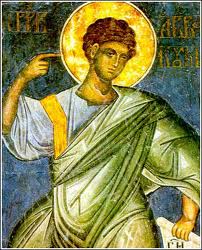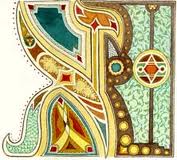The Nineteenth Sunday after Pentecost, Proper 22 - 3 October 2010
Habakkuk 1:1-4, 2:1-4
Psalm 37:1-10
II Timothy 1:1-14
Saint Luke 17:5-10
 |
| Habakkuk the Prophet |
BACKGROUND
When prophets come to mind, it is either Isaiah or Jeremiah that occupies our thoughts, and then we might turn to others, Amos, or Micah. Habakkuk, however does not leap to the forefront. His appearance in the lectionary is brief, and indeed his appearance in the history of Israel is brief, or succinct as well. He was probably a contemporary of Jeremiah, and made his utterances prior to the destruction of Jerusalem in 597 BCE, around 605, when Nebuchadnezzar defeated the Egyptian Pharaoh at Carchemish. What is important to us is what he had to say. The book is divided into three sections. The first is a Conversation between the prophet and God, in which he complains to God about the lack of justice, and continued oppression. The second is a series of curses against evil-doers (perhaps the Chaldeans or even the people of Judah, themselves). In these curses, the themes of greed, unscrupulous profits, violence, cruelty, and idolatry are addressed. The final section, a “Canticle”, is a lament, beseeching God to come to the aid of God’s people, and a description of God’s coming. Some Jewish commentaries on Habakkuk omit this final chapter.
Habakkuk 1:1-4, 2:1-4
The oracle that the prophet Habakkuk saw.
O LORD, how long shall I cry for help,
and you will not listen?
Or cry to you "Violence!"
and you will not save?
Why do you make me see wrong-doing
and look at trouble?
Destruction and violence are before me;
strife and contention arise.
So the law becomes slack
and justice never prevails.
The wicked surround the righteous--
therefore judgment comes forth perverted.
I will stand at my watchpost,
and station myself on the rampart;
I will keep watch to see what he will say to me,
and what he will answer concerning my complaint.
Then the LORD answered me and said:
Write the vision;
make it plain on tablets,
so that a runner may read it.
For there is still a vision for the appointed time;
it speaks of the end, and does not lie.
If it seems to tarry, wait for it;
it will surely come, it will not delay.
Look at the proud!
Their spirit is not right in them,
but the righteous live by their faith.
 |
| The ramparts of Jerusalem |
Like Jeremiah, Habakkuk lives at a time of political and real crisis. The power politics of the Ancient Near East are shifting, and Habakkuk is wondering where God sits in the midst of all of this change. The first paragraph from this morning’s reading is an anguished questioning of God’s motives. What are God’s intentions? When will God intervene. The second paragraph are God’s answers, written in a plain vision. God’s plans, however, will take some time “if it seems to tarry, wait for it.” God’s plans for Judah will slowly evolve, and if we read Jeremiah along with Habakkuk we can see how agonizing the wait was to be. The final comment, later alluded to in Paul, is that the life of the righteous person is found in faith.
Breaking open Habakkuk:
1. Have you ever complained to God?
2. What did you complain about and how did you do it?
3. Was there an answer?
Psalm 37:1-10 Noli aemulari
Do not fret yourself because of evildoers; *
do not be jealous of those who do wrong.
For they shall soon wither like the grass, *
and like the green grass fade away.
Put your trust in the LORD and do good; *
dwell in the land and feed on its riches.
Take delight in the LORD, *
and he shall give you your heart's desire.
Commit your way to the LORD and put your trust in him, *
and he will bring it to pass.
He will make your righteousness as clear as the light *
and your just dealing as the noonday.
Be still before the LORD *
and wait patiently for him.
Do not fret yourself over the one who prospers, *
the one who succeeds in evil schemes.
Refrain from anger, leave rage alone; *
do not fret yourself; it leads only to evil.
For evildoers shall be cut off, *
but those who wait upon the LORD shall possess the land.
 |
| The letter "aleph" |
This psalm is an acrostic, with an initial letter assigned to two verses. It’s content, largely like a wisdom psalm, is concerned with what happens to the wicked. In a way, it parallel’s Habakkuk’s concerns in his questions to God. The content of the psalm is not heavy, however, largely consisting of proverbial aphorisms on the fate of the wicked.
Breaking open Psalm 37
1. Do people in our society who do wrong cause you anxiety?
2. How do you deal with your anxiety?
3. How do you feel about the verse that advises: “Refrain from anger, leave rage alone”?
II Timothy 1:1-14
Paul, an apostle of Christ Jesus by the will of God, for the sake of the promise of life that is in Christ Jesus, To Timothy, my beloved child: Grace, mercy, and peace from God the Father and Christ Jesus our Lord.
I am grateful to God-- whom I worship with a clear conscience, as my ancestors did-- when I remember you constantly in my prayers night and day. Recalling your tears, I long to see you so that I may be filled with joy. I am reminded of your sincere faith, a faith that lived first in your grandmother Lois and your mother Eunice and now, I am sure, lives in you. For this reason I remind you to rekindle the gift of God that is within you through the laying on of my hands; for God did not give us a spirit of cowardice, but rather a spirit of power and of love and of self-discipline.
Do not be ashamed, then, of the testimony about our Lord or of me his prisoner, but join with me in suffering for the gospel, relying on the power of God, who saved us and called us with a holy calling, not according to our works but according to his own purpose and grace. This grace was given to us in Christ Jesus before the ages began, but it has now been revealed through the appearing of our Savior Christ Jesus, who abolished death and brought life and immortality to light through the gospel. For this gospel I was appointed a herald and an apostle and a teacher, and for this reason I suffer as I do. But I am not ashamed, for I know the one in whom I have put my trust, and I am sure that he is able to guard until that day what I have entrusted to him. Hold to the standard of sound teaching that you have heard from me, in the faith and love that are in Christ Jesus. Guard the good treasure entrusted to you, with the help of the Holy Spirit living in us.
 |
| Ruins at Ephesus |
The Second Epistle to Timothy is one of the three “Pastoral Epistles”. In our continuing reading in the Lectionary, we now take some time with this second letter. Some have argued that these epistles came from a hand other than Paul’s, and others have said that if any of these three was authentically Paul’s, the second epistle is it. The epistle begins with Paul’s usual graces and prayers, and then launches into the heart of the matter at hand. Timothy was Paul’s representative in the region of Ephesus, whose duty it was to maintain Pauline theology amongst the congregations founded there. In his letter, Paul addresses Timothy’s “timidity”. This would be an important point for both Paul, Timothy, and the cause of the Gospel in Asia Minor. Ephesus was an important cult center devoted to Diana – and any timidity or waffling on the Christian side would not be helpful.
Breaking open II Timothy:
- How did you learn about Christianity? Who taught it to you?
- What are your emotions when you are asked to speak about what it is that you believe?
- Do you identify with Timothy’s “timidity”?
Saint Luke 17:5-10
The apostles said to the Lord, "Increase our faith!" The Lord replied, "If you had faith the size of a mustard seed, you could say to this mulberry tree, `Be uprooted and planted in the sea,' and it would obey you.
"Who among you would say to your slave who has just come in from plowing or tending sheep in the field, `Come here at once and take your place at the table'? Would you not rather say to him, `Prepare supper for me, put on your apron and serve me while I eat and drink; later you may eat and drink'? Do you thank the slave for doing what was commanded? So you also, when you have done all that you were ordered to do, say, `We are worthless slaves; we have done only what we ought to have done!'"
 |
| Mulberry Tree |
The first ten verses of the fifteenth chapter of Luke are four “sayings” or Jesus that follow immediately after the parable about the rich man and Lazarus. None of these sayings have any thematic connection. Some are shared with Matthew and Mark, and it is almost as if Luke wants simply to record them here for his readers. The first saying is in response to the disciples’ request that Jesus “increase (their) faith”. Jesus uses hyperbole to comment on the power of faith in his parable of the mustard seed – mulberry three. The final saying is a parable on faith and service.
Breaking open the Gospel:
- Have you ever done anything outstanding because of your faith?
- Have you ever had a “miracle” happen in your life? What was it? How do you feel about it now?
- What does it mean to be a servant?
After breaking open the Word, you might want to pray the Collect for Sunday:
Almighty and everlasting God, you are always more ready to hear than we to pray, and to give more than we either desire or deserve: Pour upon us the abundance of your mercy, forgiving us those things of which our conscience is afraid, and giving us those good things for which we are not worthy to ask, except through the merits and mediation of Jesus Christ our Savior; who lives and reigns with you and the Holy Spirit, one God, for ever and ever. Amen.



Comments
Post a Comment